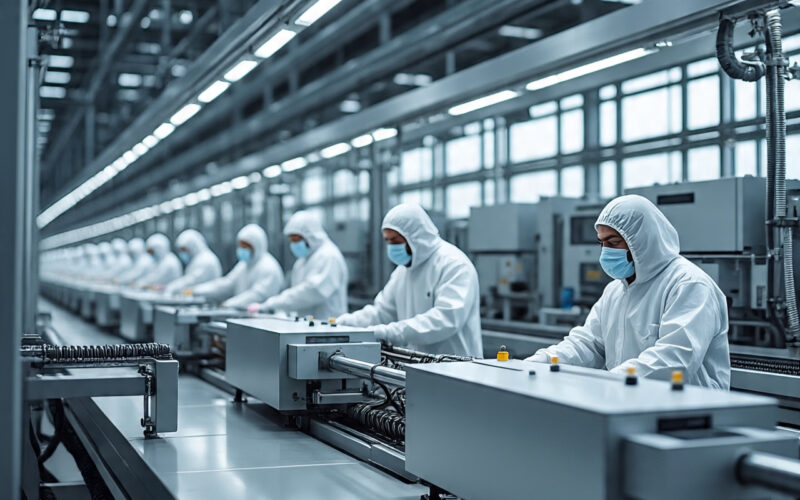#LithiumBatteries #ACC #PLI #EVIndia #GreenEnergy #BatteryStorage #EnergyTransition #MakeInIndia #AtmanirbharBharat #RenewableEnergy #ElectricVehicles #SustainableFuture #CleanTech
New Delhi: In a significant step towards energy independence and clean mobility, the Government of India has reiterated its commitment to indigenous production of advanced chemistry cell (ACC) lithium batteries. The initiative, launched under the Production Linked Incentive (PLI) ACC Scheme, is designed to reduce India’s reliance on battery imports and accelerate the transition to green energy and electric mobility.
The scheme, first approved in May 2021, carries an outlay of ₹18,100 crore for the creation of 50 GWh cell manufacturing capacity over a five-year period, after a two-year gestation. It is part of the broader National Programme on Advanced Chemistry Cell (ACC) Battery Storage, one of the government’s flagship industrial and green energy missions.
Progress So Far
According to information shared by Minister of State for Heavy Industries & Steel, Shri Bhupathiraju Srinivasa Varma, in a written reply to the Lok Sabha, remarkable progress has already been made.
-
Out of the targeted 50 GWh capacity, nearly 40 GWh has been awarded in two rounds of bidding to four beneficiary firms.
-
This 40 GWh allocation is end-use agnostic, meaning it can be deployed across multiple applications—ranging from electric vehicles (EVs) and stationary energy storage systems to consumer electronics, railways, and defence.
-
The remaining 10 GWh capacity has been earmarked specifically for Grid Scale Stationary Storage (GSSS) applications, critical for balancing renewable energy integration into the national grid.
This move not only highlights India’s seriousness in securing its energy transition goals but also underlines the government’s strategy to make India a global hub for battery production.
Why ACC Batteries Matter
Advanced Chemistry Cells (ACCs) are cutting-edge battery technologies that offer higher performance and longer lifecycle compared to conventional batteries. They are crucial for:
-
Electric Mobility: ACCs form the backbone of EV batteries, which account for over 40–50% of the cost of an electric vehicle.
-
Renewable Energy Integration: Grid-scale batteries are essential for storing intermittent solar and wind power, ensuring round-the-clock supply.
-
Electronics & Defence: From smartphones and laptops to advanced military systems, efficient energy storage is indispensable.
By boosting domestic production of these cells, India can significantly reduce dependence on imports—currently dominated by China, South Korea, and Japan—while also bringing down the cost of EVs and renewable projects.
Strategic Benefits
-
Economic Growth: The PLI ACC scheme is expected to attract substantial investments from both Indian conglomerates and global battery makers. With localisation, India aims to create direct and indirect employment opportunities across manufacturing, R&D, logistics, and allied industries.
-
Energy Security: With oil imports costing India billions of dollars annually, developing indigenous battery manufacturing is central to reducing fossil fuel dependency.
-
Climate Commitments: India has pledged to achieve Net Zero emissions by 2070 and has set aggressive targets for renewable energy adoption. ACC batteries will play a critical role in meeting these climate goals by enabling mass-scale EV adoption and reliable renewable power.
-
Make in India Push: The initiative aligns with the government’s flagship “Atmanirbhar Bharat” (self-reliant India) vision, seeking to transform the country into a global manufacturing hub for clean technologies.
Industry and Market Outlook
Experts believe that the PLI ACC scheme, combined with the rapid growth of EV adoption and renewable energy projects, will create a domestic demand of nearly 260 GWh by 2030. This demand offers India a golden opportunity to establish itself as a major exporter of lithium batteries, provided it scales up both production and technological innovation.
Indian companies such as Reliance New Energy, Ola Electric, Rajesh Exports, and Hyundai-Exide joint ventures are among the key players already investing in giga-factories to produce batteries under this scheme. Global partnerships are also expected, as leading international firms look to set up shop in India to take advantage of incentives and a rapidly expanding market.
However, challenges remain—particularly in securing raw materials such as lithium, cobalt, and nickel, much of which is concentrated in countries like Australia, Chile, and the Democratic Republic of Congo. India has been actively pursuing resource partnerships abroad, including agreements with Argentina and Australia, to ensure a steady supply of these critical minerals.
The Road Ahead
With 40 GWh already allocated and the balance 10 GWh reserved for grid-scale storage, India has taken a decisive step toward achieving its 50 GWh target under the PLI scheme. The government’s next focus will likely be on:
-
Ensuring timely commissioning of projects by beneficiary firms.
-
Encouraging R&D in newer chemistries such as solid-state batteries, sodium-ion batteries, and hydrogen-based storage technologies.
-
Building a robust supply chain for raw materials and battery recycling to achieve true sustainability.
Conclusion
The indigenous production of lithium batteries under the PLI ACC scheme represents a cornerstone of India’s clean energy and industrial policy. By creating a domestic manufacturing ecosystem, India is not only reducing its import dependency but also positioning itself as a competitive global player in the green technology race.
As EV adoption surges and renewable energy integration accelerates, the coming decade could see India emerge as one of the world’s largest centres for advanced battery manufacturing, driving both economic growth and environmental sustainability.
🔖 Hashtags
#LithiumBatteries #ACC #PLI #EVIndia #GreenEnergy #BatteryStorage #EnergyTransition #MakeInIndia #AtmanirbharBharat #RenewableEnergy #ElectricVehicles #SustainableFuture #CleanTech #IndiaGrowth

